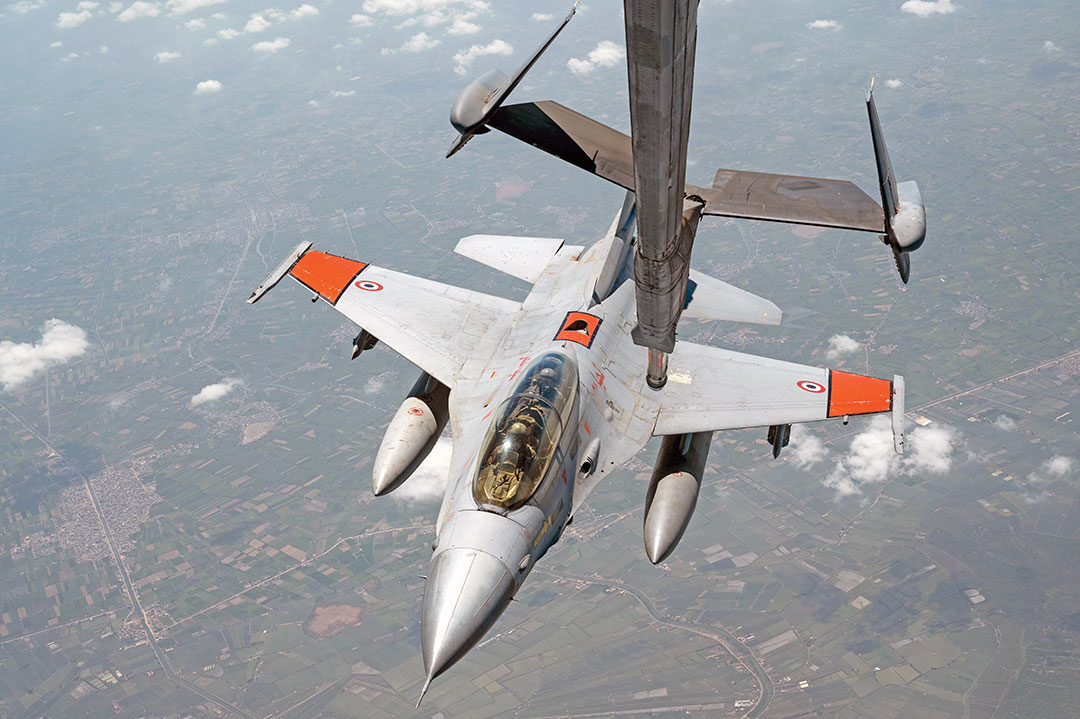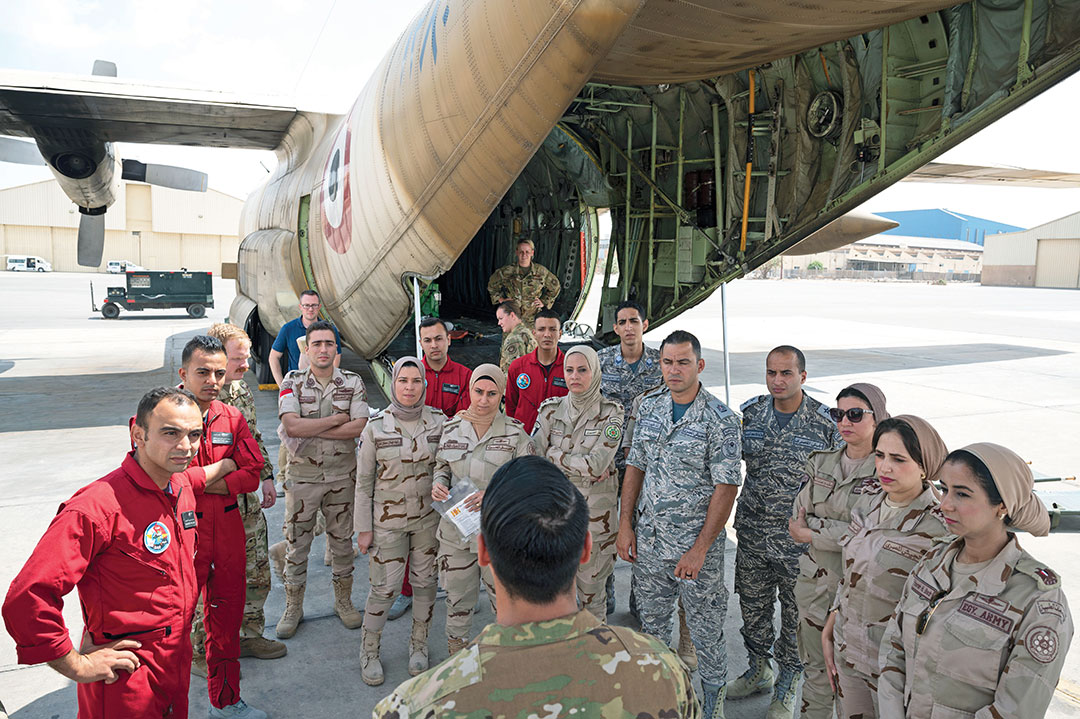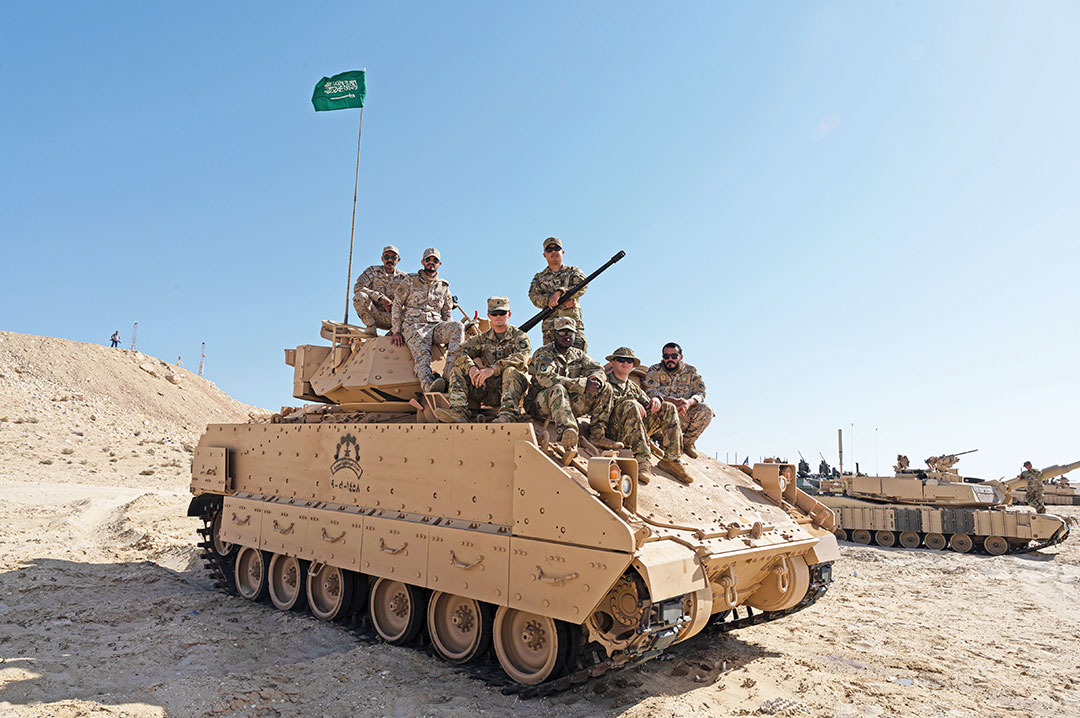Partners in Training
The Bright Star military exercise returns to Egypt with 7,600 multinational participants engaged in land, sea and air operations
UNIPATH STAFF
The U.S. Air Force KC-10 aerial refueling tanker soars through the clear Egyptian sky above a distant patchwork of Nile Delta farmland.
Matching the speed of the refueling aircraft,
an Egyptian fighter pilot guides his F-16 Fighting Falcon beneath the KC-10.
“Hold position,” says the U.S. refueling boom operator observing the link-up through the rear of the KC-10.
“Copy,” the Egyptian pilot’s voice crackles over the radio.
The refueling arm descends to the Egyptian F-16 until it reaches the fighter jet’s refueling port behind the cockpit.
“Contact!” the boom operator announces as the refueling nozzle, capable of dispensing 4,180 liters of aviation fuel per minute, edges into the F-16’s port to complete the aerial maneuver.
Such advanced teamwork — training designed to increase interoperability among partner nations to confront regional threats — was a major theme of the Bright Star 23 military exercise in Egypt.

Led by a large contingent from host nation Egypt, Bright Star’s 7,600 participants spent two weeks preparing to operate on joint missions should they be called to do so, smoothing out differences in communication, weaponry and military doctrine.
Bright Star is one of the world’s largest multinational exercises involving land, sea and air forces. The exercise, which ran from Aug. 31 to Sept. 14, 2023, was the 18th time Egypt hosted Bright Star since 1980.
“The participation of the forces themselves in carrying out joint exercises in various arenas is a very important thing. These efforts were made in a team spirit with the aim of achieving security and stability throughout the world,” said Mohammed Zaki, Egypt’s defense minister and chief of staff of the armed forces.
Seventeen nations participated in Bright Star and another 10 sent observers. From within the region came troops from Jordan, Kuwait, Pakistan, Qatar and Saudi Arabia. Egypt also invited maritime partners from the Eastern Mediterranean — Greece and Cyprus — as well as nations from Sub-Saharan Africa, including Cameroon, Malawi and South Africa. Rounding out the training audience were participants from France, Germany, Great Britain, India and Italy. Tunisia and the United Arab Emirates provided observers.
The collaborative training in the skies over Egypt with the U.S. and Egyptian air forces also happened below on the ground as multinational tank crews, artillery units and helicopters pilots converged for live-fire demonstrations on the desert floor.
It happened on the beaches, where amphibious troops backed by a multinational naval flotilla landed an assault force repulsed by other Bright Star participants at the water’s edge.
And it happened in a mock village in the desert where multinational special operation forces — many of them paratroopers dropped from Chinook helicopters and C-130 transport planes — eradicated enemy forces in a counterterrorism simulation.
“Bright Star 23 heralds the collaboration of militaries as the most potent instrument for building interoperability and regional and international cohesion,” said Pakistani Brig. Gen. Imran Shahid, head of a Pakistani contingent that numbered over 100 from the Army, Air Force and Navy.
“It gives an opportunity to display professional prowess and capabilities. It acts as a deterrent to common adversaries.”

Aside from well-rehearsed military maneuvers in the field, Bright Star’s successes also occurred among ranks of computers, within classrooms and on shooting ranges. These allowed multinational partners to learn from one another in less structured settings.
U.S. Air Force Aeromedical Evacuation trainers focused on treating and evacuating battlefield casualties to a rapt group of Egyptian military medics and nurses: Staunching bleeding, immobilizing injured limbs, clearing airways, providing oxygen. Learning went both ways. During one session, an Egyptian medic demonstrated what he described as a superior sling-making technique to the appreciative nods of U.S. partners.
Elsewhere, Kuwaiti Armed Forces medics shared their particular medical specialization with multinational partners: Treating casualties suffering from burns.
“Military joint exercises play critical roles in rebuilding and preparing forces on all levels and are considered a fundamental part of combat readiness,” Kuwaiti Brig. Gen. Meshaal Aba Al-Khiel said. “Exercises like Bright Star 23 improve soldiers’ physical and mental fitness. The Kuwaiti military understands the importance of joint exercises and makes tremendous efforts to participate in them.”
A shooting range in the desert at Mohamed Naguib Military Base drew more than 500 multinational troops for “situation tactical exercises” that covered sniping, border security, countering improvised explosive devices and unmanned aerial systems and saving lives on the battlefield.
A command post exercise, focused mostly on the evacuation of civilians from a combat zone, showed how multinational military officers could overcome cultural differences to coalesce into a joint headquarters staff. To provide authenticity, organizers ensured that some computerized scenarios synchronized with the field training at Bright Star.
A 48-hour cyber security exercise pitting two teams against each other also blended scenarios into the larger exercise. Its 18 participants came from 8 countries: Egypt, Jordan, Kuwait, Qatar, Saudi Arabia, Cameroon, India and South Africa. After a three-day “cyber academy” in which they learned concepts of cybersecurity, the trainees split into a red team that tried to penetrate the defenses of computer networks and a blue team that defended those networks.

“The exercises entail group training designed to develop professionalism and teamwork in carrying out duties. They play a major role in improving the capabilities of forces, enhancing their readiness, and advancing professionalism and high skills in performing the tasks assigned to them,” said Col. Abdullah Al-Rashood, the senior Saudi Arabian officer at Bright Star.
For the first time, Egyptians hosted a Bright Star Forum to discuss defense and security topics that included humanitarian consequences of urban warfare, unmanned systems and the use of artificial intelligence by militaries. Some of the 91 multinational students from the seminars presented their conclusions to a panel of senior commanders at the end of Bright Star.
Troops vouched for the value of using artificial intelligence (AI) to improve warfighting abilities. AI does so by improving navigation, flying and drone performance.
It helps process huge volumes of data gathered electronically, increases precision and stealth of weapons delivery and helps remove language barriers in multinational environments. On negative side, some questioned the reliability of AI decision-making in the absence of human oversight and recognized AI systems’ vulnerability to cyberattacks.
The variety of events at Bright Star is what attracted many nations to Egypt. For example, Cyprus, which conducts many bilateral training exercises with Egypt, sent a mechanized infantry team for Bright Star’s concluding live-fire demonstration, a special operations team for the counterterrorism event and part of an underwater demolition battalion for the maritime portion of the exercise.
The approximately 70 Cypriot participants planned to share knowledge acquired at Bright Star with their comrades back home, said Maj. Stelios Krashias, who attended the exercise with colleagues from the Cyprus National Guard.
“All of this cooperation has been groundbreaking and allows us to work together with colleagues in a wide range of Army, Air, Naval, Special Forces as well as other kind of exercises and activities that cover almost all military branches and tactics,” Maj. Krashias said.
Egyptian commanders expressed the desire that Bright Star continues to grow with a greater variety of events suited to a full range of military specialties. Egypt hosts Bright Star every two years, and the next iteration of the exercise is scheduled for 2025.
“During training, whether command and control topics or tactical topics in performing specific activities at the level of land, air or sea, and thus integrating all these activities together during the exercise, is something that brings happiness. We hope that the volume of participation in future training will be greater by the participating countries.” Gen. Zaki said.


Comments are closed.